|
Books Should Be Free Loyal Books Free Public Domain Audiobooks & eBook Downloads |
|
|
Books Should Be Free Loyal Books Free Public Domain Audiobooks & eBook Downloads |
|
War Stories |
|---|
|
Book type:
Sort by:
View by:
|
By: Mabel Annie Stobart (1862-1954) | |
|---|---|
 War and Women
War and Women
"The sending of a Women’s Convoy Corps to the Balkans was the result of Mrs. Stobart’s keen desire to demonstrate the ability of women to render signal service under war conditions and without the direction and assistance of men. This record of their achievements, therefore, provides a strong vindication of the claims of women to inclusion in the Territorial Defence Scheme". | |
By: Marcel Dupont (1879-1964) | |
|---|---|
 In the Field (1914-1915)
In the Field (1914-1915)
I have merely tried to make a written record of some of the hours I have lived through during the course of this war. A modest Lieutenant of Chasseurs, I cannot claim to form any opinion as to the operations which have been carried out for the last nine months on an immense front. I only speak of things I have seen with my own eyes, in the little corner of the battlefield occupied by my regiment. | |
By: Mark Twain (1835-1910) | |
|---|---|
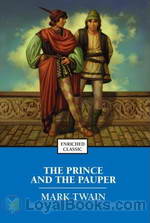 The Prince and the Pauper
The Prince and the Pauper
A poor young boy from the slums of London watches a royal procession pass, with the youthful Prince of Wales riding at its head. He ventures too close and is caught and beaten by the Prince's guards. However, the young royal stops them and invites the vagrant to the palace. Here the two boys sup alone and are stunned to discover that they bear a startling resemblance to each other. The Prince is Edward, long awaited heir of the monarch, Henry VIII, while the vagrant is Tom Canty, the son of a thief and a beggar... | |
 Personal Recollections of Joan of Arc, Volumes 1 & 2
Personal Recollections of Joan of Arc, Volumes 1 & 2
Mark Twain’s work on Joan of Arc is titled in full “Personal Recollections of Joan of Arc, by the Sieur Louis de Conte.” De Conte is identified as Joan’s page and secretary. For those who’ve always wanted to “get behind” the Joan of Arc story and to better understand just what happened, Twain’s narrative makes the story personal and very accessible. The work is fictionally presented as a translation from the manuscript by Jean Francois Alden, or, in the words of the published book, “Freely Translated out of the Ancient French into Modern English from the Original Unpublished Manuscript in the National Archives of France... | |
 Anti-imperialist writings
Anti-imperialist writings
This audiobook is a collection of Mark Twain's anti-imperialist writings (newspaper articles, interviews, speeches, letters, essays and pamphlets). | |
By: Martin Alonzo Haynes (1842-1919) | |
|---|---|
 Minor War History
Minor War History
A personal history of the American Civil War taken from the author's own letters to 'the girl he left behind', who later became his wife. This is not a complete history and does not deal with major events, but is a snapshot of life in the Second New Hampshire Regiment and humanizes the history we study. Haynes went on to have an illustrious career. After the war, he founded a local newspaper, of which he was editor. He was also elected to the New Hampshire House of Representatives, and became clerk to the county Supreme Court... | |
By: Mary Chesnut | |
|---|---|
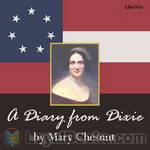 A Diary from Dixie
A Diary from Dixie
Mary Boykin Miller Chesnut, a well-educated South Carolina woman who was the wife of a Confederate general, kept extensive journals during the Civil War. Mrs. Chesnut moved in elite circles of Southern society and had a keen interest in politics. Her diary is both an important historic document and, due to her sharp wit and often irreverent attitude, a fascinating window into Southern society of the time. This recording is of the first published edition of the diary, compiled from Mrs. Chesnut's revisions of her original journals. | |
By: Mary Grant Bruce (1878-1958) | |
|---|---|
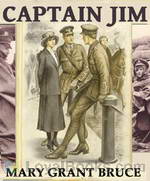 Captain Jim
Captain Jim
This book is about Norah Linton, her brother Jim, her father David and Jim's chum Wally from Australia. They all move to England during WWI because Jim and Wally want to fight in the war.When a Irish friend of the family dies, Norah inherits a big house in Surrey: Homewood. To keep up the Irishman's memory they want to use the house to help the war effort. They turn it into a home for "Tired People"--soldiers recovering from injuries, or soldiers on leave that have no family to go home to, can come here to have a good time and enjoy the country-side, so that they can go back to their regiments fully rested and restored... | |
By: Mary Hazel Snuff | |
|---|---|
 Study Of Army Camp Life During American Revolution
Study Of Army Camp Life During American Revolution
Housing, Food, Clothing, Health, Sanitation, Recreation, Religion, Duties, Discipline. A thesis submitted in partial fulfillment of the requirements for the degree of master of arts in history in the Graduate School of the University of Illinois 1918. - Summary by David Wales | |
By: Mary Rhodes Waring Henagan | |
|---|---|
 Two Diaries From Middle St. John's, Berkeley, South Carolina, February - May, 1865
Two Diaries From Middle St. John's, Berkeley, South Carolina, February - May, 1865
Two diaries from Middle St. John’s, Berkeley, South Carolina, February – May, 1865. Journals kept by Miss Susan R. Jervey and Miss Charlotte St. Julien Ravenel, at Northampton and Poooshee Plantations, and reminiscences of Mrs. Henagan. With two contemporary reports from Federal officials. Published by the St. John’s Hunting Club, Middle St. Johns, Berkeley, South Carolina, 1921. - Summary by Book title and david wales | |
By: Mary Roberts Rinehart (1876-1958) | |
|---|---|
 The Amazing Interlude
The Amazing Interlude
It is the early days of The Great War. As the curtain rises, Sara Lee is sitting by the fire in her aunt and uncle’s home, knitting a baby afghan. Her beau’s name is Harvey. He has his eye on a little house that is just perfect for two and he will soon propose to Sara Lee. But in this play, the mise en scène is about to change. A fairyland transformation will take place and Sara Lee will step into a new and different story, where she is the princess in a forest of adventure. There is a prince, too, whose name is Henri... | |
 Kings, Queens and Pawns: An American Woman at the Front
Kings, Queens and Pawns: An American Woman at the Front
A personal account of the American author's visit to Europe in January 1915 while a war correspondent in Belgium for The Saturday Evening Post. She writes: "War is not two great armies meeting in a clash and frenzy of battle. It is much more than that. War is a boy carried on a stretcher, looking up at God's blue sky with bewildered eyes that are soon to close; war is a woman carrying a child that has been wounded by a shell; war is spirited horses tied in burning buildings and waiting for death; war is the flower of a race, torn, battered, hungry, bleeding, up to its knees in icy water; war is an old woman burning a candle before the Mater Dolorosa for the son she has given... | |
By: Mary Rowlandson (c.1637-1711) | |
|---|---|
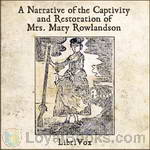 A Narrative of the Captivity and Restoration of Mrs. Mary Rowlandson
A Narrative of the Captivity and Restoration of Mrs. Mary Rowlandson
This is the story of Mary Rowlandson’s capture by American Indians in 1675. It is a blunt, frightening, and detailed work with several moments of off-color humor. Mary, the wife of a minister, was captured by Natives during King Philips War while living in a Lancaster town, most of which was decimated, and the people murdered. See through her eyes, which depict Indians as the instruments of Satan. Her accounts were a best-seller of the era, and a seminal work, being one of the first captivity narratives ever published by a woman... | |
By: Mary Seacole (1805-1881) | |
|---|---|
 Wonderful Adventures of Mrs. Seacole in Many Lands
Wonderful Adventures of Mrs. Seacole in Many Lands
I should have thought that no preface would have been required to introduce Mrs. Seacole to the British public, or to recommend a book which must, from the circumstances in which the subject of it was placed, be unique in literature. If singleness of heart, true charity, and Christian works; if trials and sufferings, dangers and perils, encountered boldly by a helpless woman on her errand of mercy in the camp and in the battle-field, can excite sympathy or move curiosity, Mary Seacole will have many friends and many readers... | |
By: May Sinclair (1863-1946) | |
|---|---|
 Journal of Impressions in Belgium
Journal of Impressions in Belgium
In 1914, at the age of 51, the novelist and poet May Sinclair volunteered to leave the comforts of England to go to the Western Front, joining the Munro Ambulance Corps ministering to wounded Belgian soldiers in Flanders. Her experiences in the Great War, brief and traumatizing as they were, permeated the prose and poetry she wrote after this time. Witness of great human pain and tragedy, Sinclair was in serious danger of her life on multiple occasions. This journal makes no attempt to be anything more than a journal: a lucid, simple, heart-breaking account of war at first hand. | |
By: Milo Hastings (1884-1957) | |
|---|---|
 In the Clutch of the War-God
In the Clutch of the War-God
In three parts, from Physical Culture magazine, July - September, 1911. In this story, the author warns of the coming of a world war between Japan and U.S. While the Japanese have a superior society, they suffer from food shortages and over-population so go to war with the U.S., who is plagued by a society of ill health and habit. Some predictions are remarkably accurate. The story itself was commissioned by Bernarr Macfadden, who was an early proponent of health and fitness in the U.S. and founded the magazine publisher McFadden Publications. - Summary by Kate Follis | |
By: Morgan Robertson | |
|---|---|
 Futility, Or the Wreck of the Titan
Futility, Or the Wreck of the Titan
This novel was published a full 14 years before the sinking of the Titanic, but listeners may be surprised at how many parallels this fictional tale has with subsequent true events. The Titan is the largest and most technologically advanced steamship of her time. She is considered unsinkable. Her full speed crossings of the Northern Lane Route carry her rich passengers in the highest standards of luxury and comfort. The less well-off travel in rougher quarters but still benefit from the speed of travel... | |
By: N. P. Dawson | |
|---|---|
 Good Soldier; A Selection Of Soldiers' Letters, 1914-1918
Good Soldier; A Selection Of Soldiers' Letters, 1914-1918
“Here are boys, all sorts of boys: French, English, Italian, American… These are soldiers’ letters written home. But reading, one finds that he does not think of them as letters at all, but as boys… but the spirit of these letters cannot be defeated. The dead will rise again.” Each letter is introduced by a paragraph or two about the writer. - Summary by Author's Introduction and David Wales | |
By: Nellie McClung (1873-1951) | |
|---|---|
 Three Times and Out
Three Times and Out
The true story of M. C. Simmons, a Canadian soldier captured by the German Army during the early days of World War I. We read of his sixteen months of imprisonment, his encounters with other captured troops of the other Allied armies and his observations of the nature of his captors and their countrymen. Most compellingly we read of his escape from POW camp, his recapture and punishment, and then the capture and punishment following his second escape attempt, climaxing in his third escape attempt and daring travel through enemy territory against all odds... | |
By: Niccolò Machiavelli (1469-1527) | |
|---|---|
 Art of War (Neville Translation)
Art of War (Neville Translation)
The Art of War is the only book published by Niccolo Machiavelli during his lifetime, and he saw it as one of his finest achievements. The Art of War develops many themes introduced in Machiavelli’s earlier works “The Prince” and “Discourses” and presents them as the collected wisdom of a fictional leader Lord Fabrizio Colonna. The book is constructed as a series of dialogues supposedly held during a summer afternoon spent in the Orti Oricellari gardens in Florence.The stated aim is “To... | |
By: Nicholas Canzona (1925-1985) | |
|---|---|
 U. S. Marine Operations in Korea 1950-1953, Volume 1: The Pusan Perimeter
U. S. Marine Operations in Korea 1950-1953, Volume 1: The Pusan Perimeter
It meant little to most Americans on 25 June 1950 to read in their Sunday newspapers that civil strife had broken out in Korea. They could hardly have suspected that this remote Asiatic peninsula was to become the scene of the fourth most costly military effort of American history, both in blood and money, before the end of the year. With a reputation built largely on amphibious warfare, Marines of the 1st Brigade were called upon to prove their versatility in sustained ground action. On three separate occasions within the embattled Perimeter—south toward Sachon and twice along the Naktong River—these Marine units hurled the weight of their assault force at the enemy... | |
 U.S. Marine Operations in Korea, 1950-1953, Volume 2: The Inchon-Seoul Operation
U.S. Marine Operations in Korea, 1950-1953, Volume 2: The Inchon-Seoul Operation
The Inchon Landing was a major amphibious operation, planned in record time and executed with skill and precision. Even more, it was an exemplification of the fruits of a bold strategy executed by a competent force. The decision to attack at Inchon involved weakening the line against enemy strength in the Pusan Perimeter in order to strike him in the rear. It involved the conduct of an amphibious attack under most difficult conditions of weather and geography. It ultimately culminated with combat in the heart of Seoul. - Summary by Lemuel C. Shepherd, Jr. and Aaron Bennett | |
By: Oliver Wendell Holmes, Sr. (1809-1894) | |
|---|---|
 My Hunt After 'The Captain'
My Hunt After 'The Captain'
Holmes describes his frantic search through Civil War torn landscapes for his wounded son, the future Supreme Court Justice. Originally published in The Atlantic Magazine, 1862. Holmes, Sr. (1809 -1894) was an American physician, poet, professor, lecturer, and author. He was regarded by his peers as one of the best writers of the 19th century. His most famous prose works are the "Breakfast Table" series, which began with The Autocrat of the Breakfast Table (1858). He is also recognized as an important medical reformer. | |
By: P. G. Wodehouse (1881-1975) | |
|---|---|
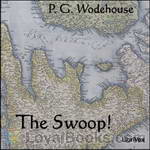 The Swoop!
The Swoop!
The Swoop! tells of the simultaneous invasion of England by several armies — “England was not merely beneath the heel of the invader. It was beneath the heels of nine invaders. There was barely standing-room.” (ch. 1) — and features references to many well-known figures of the day, among them the politician Herbert Gladstone, novelist Edgar Wallace, actor-managers Seymour Hicks and George Edwardes, and boxer Bob Fitzsimmons. | |
By: Padraic Colum (1881-1972) | |
|---|---|
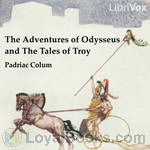 The Adventures of Odysseus and the Tale of Troy
The Adventures of Odysseus and the Tale of Troy
Also known as “The Children’s Homer,” this is Irish writer Padraic Colum’s retelling of the events of Homer’s Iliad and Odyssey for young people. Colum’s rich, evocative prose narrates the travails of Odysseus, King of Ithaca: his experiences fighting the Trojan War, and his ten years’ journey home to his faithful wife Penelope and his son Telemachus. | |
By: Pat O'Brien (1890-1920) | |
|---|---|
 Outwitting The Hun; My Escape From A German Prison Camp
Outwitting The Hun; My Escape From A German Prison Camp
A true war narrative, published in 1918 while WWI was still going on. | |
By: Philip Gibbs (1877-1962) | |
|---|---|
 Now It Can Be Told
Now It Can Be Told
In this book I have written about some aspects of the war which, I believe, the world must know and remember, not only as a memorial of men's courage in tragic years, but as a warning of what will happen again--surely--if a heritage of evil and of folly is not cut out of the hearts of peoples. Here it is the reality of modern warfare not only as it appears to British soldiers, of whom I can tell, but to soldiers on all the fronts where conditions were the same... The purpose of this book is to get... | |
By: Phoebe Yates Pember (1823-1913) | |
|---|---|
 Reminiscences of a Southern Hospital, by Its Matron
Reminiscences of a Southern Hospital, by Its Matron
Phoebe Yates Pember served as a matron in the Confederate Chimborazo military hospital in Richmond, Virginia, during the Civil War, overseeing a dietary kitchen serving meals to 300 or more wounded soldiers daily. Reminiscences of a Southern Hospital is her vivid recounting of hospital life and of her tribulations (and personal growth) as a female administrator. To follow her from day one, when she is greeted with “ill-repressed disgust” that “one of them had come,” and she, herself, “could... | |
By: Pierre Loti (1850-1923) | |
|---|---|
 War
War
Pierre Loti [Julien Viaud] (1850-1923) was a French naval officer and novelist. The present book is one of his few works of non-fiction, a small collection of letters and diary entries that describe his views and experiences in the wars and military operations in which he participated. Besides World War I, he also sheds light upon his views and involvement in the preparations for the Turkish Revolution of 1923, for which until today a famous hill and popular café in Istanbul are named after him. | |
By: Ralph Scott | |
|---|---|
 Soldier's Diary
Soldier's Diary
This 1923 memoir of a World War I soldier is a well written much respected first-hand account of the brutal fighting in the last year of the war. - Summary by David Wales | |
By: Ralph W. Bell | |
|---|---|
 Canada in War-Paint
Canada in War-Paint
There is no attempt made in the little sketches which this book contains to deal historically with events of the war. It is but a small Souvenir de la guerre—a series of vignettes of things as they struck me at the time, and later. I have written of types, not of individuals, and less of action than of rest. The horror of war at its worst is fit subject for a master hand alone. - Summary by the author, Capt. Ralph W. Bell | |
By: Randall Garrett (1927-1987) | |
|---|---|
 The Highest Treason
The Highest Treason
Set in a future in which humanity’s dream of total equality is fully realized and poverty in terms of material wealth has been eliminated, humanity has straight-jacketed itself into the only social system which could make this possible. Class differentiation is entirely horizontal rather than vertical and no matter what one’s chosen field, all advancement is based solely on seniority rather than ability. What is an intelligent and ambitious man to do when enslaved by a culture that forbids him from utilizing his God-given talents? If he’s a military officer in time of war, he might just decide to switch sides... | |